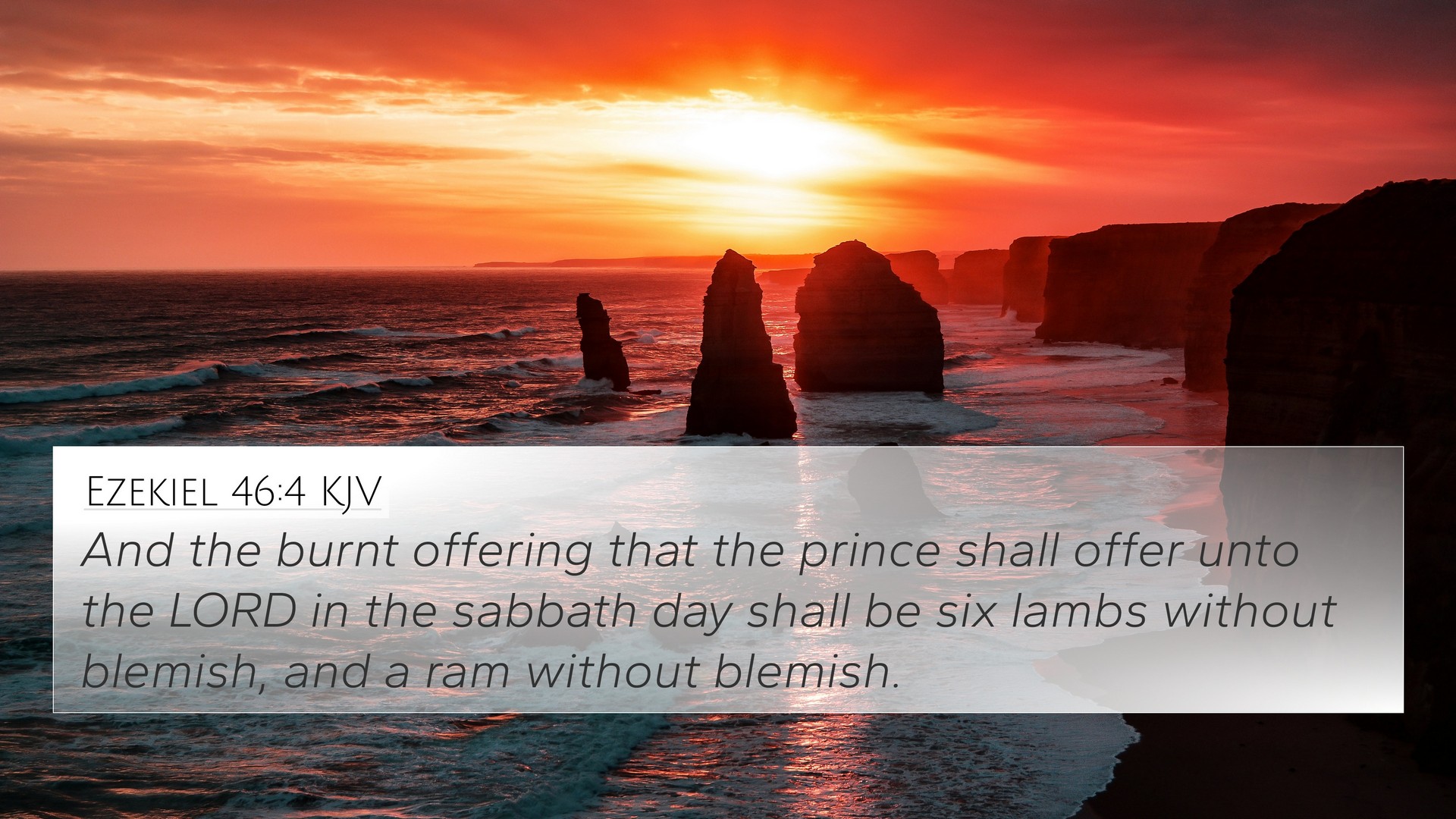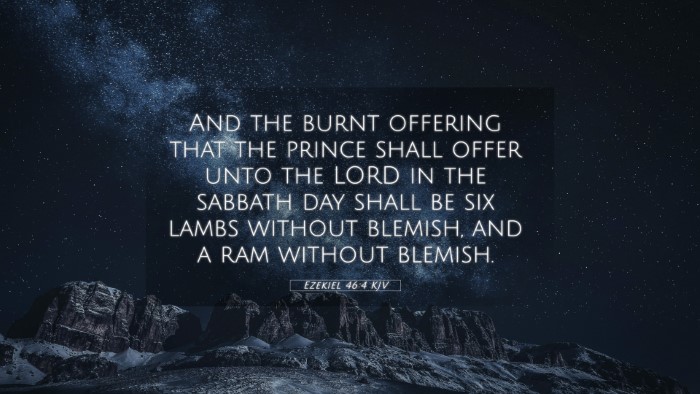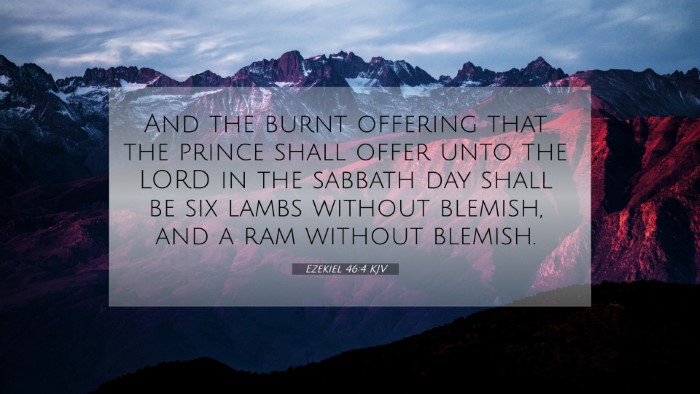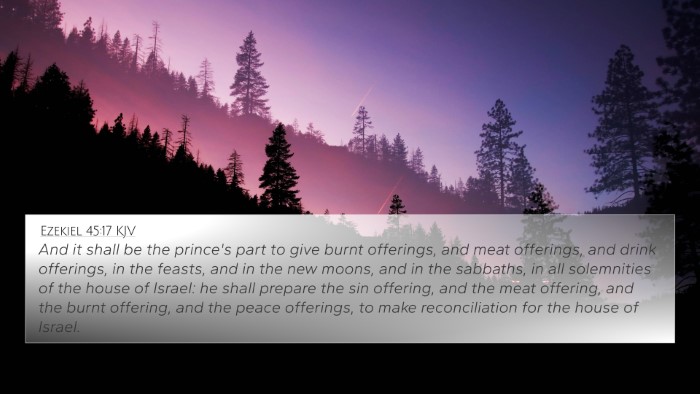Understanding Ezekiel 46:4
Ezekiel 46:4 states: "And the burnt offering that the prince shall offer unto the LORD in the sabbath day shall be six lambs without blemish and a ram without blemish."
Overview of Ezekiel 46
The book of Ezekiel, a significant prophetic book in the Old Testament, contains messages directed to Israel and provides a vision of the future temple and its worship practices. Ezekiel 46 focuses on the regulations surrounding worship and sacrifices in the upcoming temple, emphasizing proper procedures and the central role of leadership in worship.
Commentary Insights
- Matthew Henry: Henry highlights the importance of observing the Sabbath by offering specific sacrifices. He notes that these offerings exemplify the continuation of the sacrificial system and signify dedication to God.
- Albert Barnes: Barnes explains that this verse signifies the prince's role in maintaining proper worship. He remarks on the inclusion of six lambs, which reflects completeness and a dedication to God, reinforcing the holiness of the Sabbath.
- Adam Clarke: Clarke interprets this passage as a directive for how the new temple’s prince should approach worship. He discusses how these offerings symbolize surrender and commitment to God’s covenant, particularly highlighting the significance of blemish-free sacrifices.
Significance of Sacrifice
The specific instructions for sacrifices made in Ezekiel 46:4 serve several purposes:
- Obedience: Following God's instructions reflects obedience and faithfulness to His covenants (Deuteronomy 12:5).
- Representation: The burnt offerings represent the community's devotion toward God and the acknowledgment of His sovereignty (Leviticus 1:3).
- Purity: Offering blemish-free animals symbolizes the necessity of purity in offerings, paralleling New Testament themes of Christ as the unblemished Lamb (1 Peter 1:19).
Cross-References
Ezekiel 46:4 connects with several other Bible verses that shed light on its themes:
- Leviticus 22:19-22: Discusses the requirements for sacrificial animals.
- Isaiah 66:23: Refers to Sabbath observance and its importance in worship.
- John 1:29: Presents Jesus as the Lamb of God, linking to the concept of sacrificial offerings.
- Hebrews 10:1-4: Highlights the significance and insufficiency of the old sacrificial system.
- Matthew 5:17-18: Illustrates Jesus’ fulfillment of the Law, establishing continuity between the sacrifice themes.
- Romans 12:1: Emphasizes offering oneself as a living sacrifice, echoing the principles of dedication in Ezekiel.
- 1 Corinthians 5:7: Compares the concept of sacrifice to the New Testament understanding through Christ.
Connections and Thematic Analysis
The verse establishes a thematic connection to other instances in the Bible that focus on:
- Worship Practices: It captures the essence of worship ingrained in the Hebrew tradition and later echoed in Christian worship.
- Blemish-free Sacrifices: The principle of offering unblemished sacrifices reflects a standard that threads through both Testaments (Malachi 1:8).
- The Role of Leaders: The prince’s involvement highlights the leadership's responsibility in guiding worship and adhering to God's commands.
Applications for Today
The remnants of the sacrificial system highlight God's desire for holiness and dedication. Applying these ancient practices to modern worship involves seeking purity in our offerings—be it our time, talents, or treasures—reflecting a heart surrendered to God.
Tools for Bible Cross-Referencing
To deepen your understanding of connections within the Scriptures, you can utilize:
- Bible Concordance: Useful for finding specific terms and their occurrences throughout the Bible.
- Cross-Reference Guide: Helps identify relevant passages that relate to each other.
- Bible Chain References: Traces themes and teachings through interconnected verses.
- Comprehensive Bible Cross-Reference Materials: Offers extensive links for deeper study.
Conclusion
Ezekiel 46:4 serves as a reminder of God's faithfulness and the importance of dedicated worship. By understanding how this verse connects with the broader narrative of Scripture, believers can enrich their faith and worship practices, embracing the biblical principles of sacrifice, obedience, and reliance on God's provisions.




